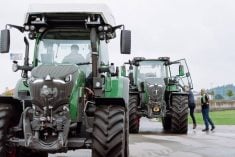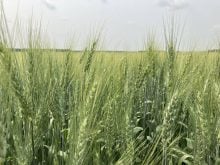Manitoba Crop Alliance has started a program in which it takes ‘whole-farm, cross-commodity approaches to research’
Most crop research in Canada is highly specific.
A plant pathologist may study a specific disease, like fusarium head blight in spring wheat. Or a soil fertility expert will look at the phosphorus needs of flax.
That research happens because the group representing a single commodity, a provincial wheat commission or a flax association, will fund the research.
This research model can be effective, but it also has limitations.
Farmers grow more than one crop, and the agronomics and economics of crop production are more complex than one issue in a particular crop.
Read Also

Why feds imposed EV tariffs
Moe and Kinew have a fight on their hands when it comes to eliminating the EV tariff. Canada has to worry about pissing off the U.S. and Mexico and hundreds of thousands of auto workers.
That’s why the Manitoba Crop Alliance has started a program called Whole Farm Research.
In addition to its support for specific crop research, MCA is now funding “whole-farm, cross-commodity approaches to research,” its website says.
“Sometimes we all need to take a step back and recognize that we’re working in a cropping system. Not within individual crop types,” said Katherine Stanley, research program manager for special crops with the MCA.
“Maybe you’re doing a breeding project, or a fungicide trial. That’s obviously narrowed-in to that (crop and disease)…. Maybe (instead) look at the whole crop rotation. Are there crops you can grow before or after that reduce the incidence or severity?”
The MCA is the right organization to run such a program because it represents six commodities: spring wheat, winter wheat, barley, corn, flax and sunflowers.
The cross-commodity group launched the Whole Farm Research program last year, with the following priorities:
- crop rotation innovation
- soil health
- cover crops and inter-cropping
- weeds, diseases and insects
- water (managing droughts and flooding)
“There has been a lot of interest in more cross commodity, cropping systems type research… that didn’t fall within that one-crop category,” Stanley said.
There’s a large opportunity to study the agronomics of crop rotations, including things like pest management, nutrient use and water use efficiency.
One of its whole farm projects is $227,750 for Ramona Mohr, an Agriculture Canada scientist in Brandon, who is studying “the effect of crop rotation (crop choice, crop sequence, and rotation duration) on crop yield and quality, disease incidence and severity, profitability and economic risk, soil health and nutrient cycling,” the MCA website says.
The MCA research will also focus on the economics of the whole farm, rather than the economics of a particular crop.
“When we are looking at rotation studies or things like cover crops… what is the economic implication?” Stanley said.
“That’s something we’re just ramping up that hasn’t (received) a lot of focus in the past, because of the crop specific (research) that we’ve been doing…. We’re working with the University of Manitoba to bridge fund an agri-business researcher position.”
A large part of the Whole Farm Research program will be communications and extension.
The Manitoba Crop Alliance has created a new position, an extension specialist for whole farm research, to make farmers aware of the results and how to implement the findings.
















